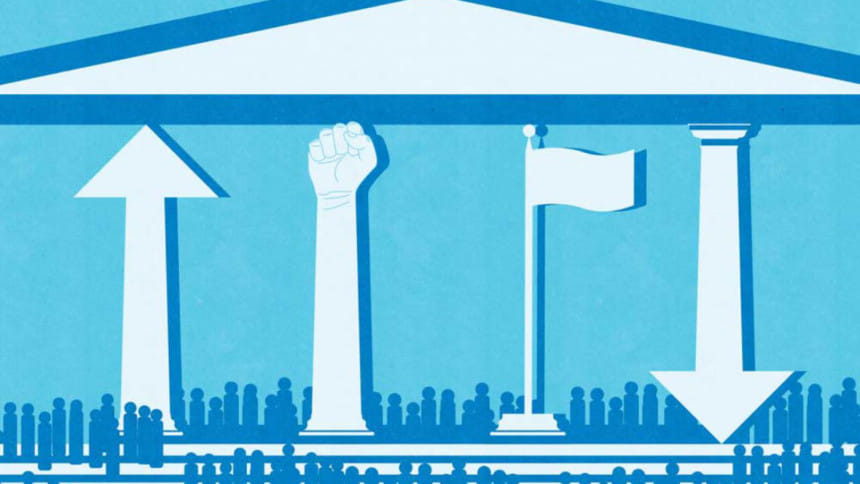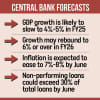Hiccups of 'Development Surprise'

Bangladesh's economic growth and development performance over the past two decades have been impressive. With the poor quality of institutions, such a performance has often been termed as a "development surprise" or the "Bangladesh paradox". But is it at all a "surprise" or a "paradox" (anything beyond any reasonable explanation can appear as a paradox)? Is Bangladesh's development performance beyond any "reasonable" explanation?
If we look at the quality of institutions in Bangladesh, the performance has been very poor. According to the World Governance Indicators (WGI), in 2016, out of 156 countries, Bangladesh ranked 114 in terms of "Voice and Accountability", 101 for "Political Stability", 138 for "Government Effectiveness", 114 for "Regulatory Quality", 101 for "Rule of Law", and 117 for "Control of Corruption". Other indicators of institutional quality also portray similar pictures. For example, in the case of the World Bank's Doing Business Index of 2019, out of 190 countries, Bangladesh's ranking was 176. With respect to Transparency International's Corruption Perceptions Index of 2018, Bangladesh's ranking was 149 out of 180 countries. In the case of the Global Competitiveness Index (GCI) of 2017-2018, Bangladesh's ranking was 99 out of 137 countries.
Against the aforementioned poor quality of institutions, the average GDP growth rate in Bangladesh increased from 3.7 percent in the 1970s to 6.6 percent in the 2010s. Bangladesh has been able to increase the average GDP growth rate by one percentage point for each decade since the 1990s. The country cut down the poverty rate from as high as 71 percent in the 1970s to 24 percent in 2016, became the second largest exporter of readymade garments in the world, and registered some notable progress in social sectors.
How do we reconcile the two above-mentioned contrasting scenarios? Difficulty in such reconciliation perhaps has led to the emergence of the ideas of "surprise" or "paradox". However, we can try offering some reasonable explanations to this so-called "surprise" or "paradox". We also argue that, without significant improvements in the quality of institutions, such "surprise" will continue to lead to periodic "hiccups" like the accidents in the RMG sector (several fire incidents, Rana Plaza incident of factory collapse); frequent road accidents; frequent fire incidents in the residential and commercial areas; repeated scams in the financial sector; serious environmental degradation in cities, rivers and forest areas; periodic labour unrest; uncontrolled scams in public examinations; social disintegration among youth in the form of extremism and substance abuse.
Now, coming back to some reasonable explanations of "surprise" or "paradox", if we look at some well-known institutional indicators (WGI, Doing Business, Transparency International, and GCI), all refer to the quality of formal institutions. However, in countries like Bangladesh, placed at the lower level of the development spectrum, what governs is a host of informal institutions, and the development of formal institutions is weak and fragile. There are some interesting political economy frameworks to understand the importance of informal institutions in developing countries. For example, Mushtaq Khan's framework of "growth-enhancing institutions" in contrast to "market-enhancing institutions" elaborates how the role of informal institutions can be critical in developing countries. Some developing countries, especially East and Southeast Asian countries, have been successful in steering unconventional institutions to drive growth. Another framework, proposed by Lant Pritchett, Kunal Sen and Eric Wrecker, relates to the idea of "deals space". Deals (informal), in contrast to rules (formal), among the political and economic elites, are prevalent in developing countries. Deals can be open (access is open to all) or closed (access is restricted), and also they can be ordered (deals are respected) or disordered (deals are not respected). According to this view, countries are likely to exhibit high growth when deals are open and ordered.
Informal institutions can have two distinct roles with respect to the stages of development. At the early stage of development, if countries can steer the informal institutions to the extent they are "growth-enhancing", and if the "deals space" is more ordered (either open or closed), countries can manage a regime of strong growth rate and can also achieve some improvements in the social sector. However, for the transition from a lower stage of development to a higher stage, whether the country can maintain the high growth rate and achieve bigger development goals, depends on the dynamics of how the informal institutions evolve and formal institutions become stronger and functional. Not many developing countries have been able to do this. Certainly, the East Asian and most of the Southeast Asian countries are the success stories in using the informal institutions efficiently at the early stage of development as well as having some notable successes in the transition towards functional formal institutions.
In contrast to many other comparable countries of Asia and Africa at similar stages of development, least developed countries, in particular, Bangladesh has been successful in creating some efficient pockets of "growth-enhancing" informal institutions against an overall distressing picture of formal institutions. This is how the "Bangladesh Surprise" story unfolds. The examples of "pockets of efficient informal institutions" in Bangladesh include the well-functioning privileges and special arrangements for the RMG sector, promotion of labour exports, agricultural research and development related to food security, and microfinance.
However, the next question is: how can Bangladesh create such "pockets of efficient informal institutions" and make the "best" use of them? The explanations include both historical and political economy perspectives. Two historical events strongly influenced the mindset of the political and economic elites in Bangladesh. First, the 1971 Liberation War led to the emergence of an independent Bangladesh state which gave unprecedented, enormous and first time independent power to the burgeoning political and economic elites of the Bengali nation of this part of the world. Also, the citizens, in general, enjoyed some benefits of such power. Largely, the entrepreneurial nature of the people of this country is deeply rooted in this feeling of power. The reflection of successful entrepreneurship is seen in the cases of the RMG sector, labour migration, and microfinance. As Bangladesh is not rich in natural resources, elites found the RMG sector as a basis of generation of substantial rents. The sources of rents in the RMG sector include the Multifibre Arrangements (MFA) quota (which no longer exists) and the Generalised Systems of Preference (GSP), different forms of subsidies, tax exemptions, a suppressed labour regime, and weak compliance. Through large-scale employment generation in the RMG sector and its induced effects of poverty alleviation and female empowerment, the elites were also able to draw support from the non-elites for this sector. The second event relates to the experience of the 1974 famine, which led the elites to realise that a country like Bangladesh, with a huge population in a small piece of land, cannot afford anything like this in the future. Therefore, subsequent governments focused on the development of the agricultural sector to ensure food security. All these also helped achieve some notable progress on the social fronts.
Despite the aforementioned achievements, the fundamental question is whether Bangladesh can continue its trajectory of success and achieve bigger development goals with the business as usual processes. There are concerns that the weak institutional capacity of the country may work as a binding constraint as the country eyes stiff targets of the Sustainable Development Goals (SDGs) set for 2030, aspires to become an upper middle-income country by 2031, and has a vision to become a developed country by 2041. Dividends from the existing "pockets of efficient informal institutions" are on a decline, and the elites have not been able to create any such new "pockets" apart from the ones mentioned above.
How is Bangladesh performing in terms of the transition from some "pockets of efficient informal institutions" to well-functioning formal institutions? This can be answered by looking at how well the formal institutions are taking shape. The trends in the quality of formal institutions between 1996 and 2016, as are manifested by the movements of the World Governance Indicators, suggest that, with some fluctuations, there are deteriorations in the cases of "Voice and Accountability", "Political Stability" and "Government Effectiveness", and some trivial improvements in the cases of "Regulatory Quality", "Rule of Law" and "Control of Corruption". As the country is faced with a number of challenges related to slow progress in structural transformation, lack of economic diversification, high degree of informality in the labour market, slow pace of job creation, poor status of social and physical infrastructure, slow reduction in poverty, and rising inequality, such poor pace of improvement of formal institutions will make hiccups of "development surprise" a rule rather than an exception.
Dr. Selim Raihan is Professor, Department of Economics, University of Dhaka, Bangladesh, and Executive Director, South Asian Network on Economic Modeling (SANEM).
Email: [email protected]










Comments